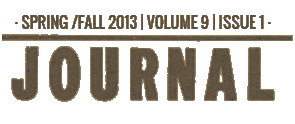· SPRING /FALL 2013 | VOLUME 9 | ISSUE 1 ·
Rougarou, an online literary journal.
A Vaulting Echo
Todd Easton Mills
O the Valley, landfill of braking lights.
Bowl of parked dreams.
Shall I take off my shoes, Mrs. Kim?
Dewey walked up to the new, infill, Mediterranean on Shoup — an overlarge, underengineered house with wide Spanish arches and hollow, wrought-iron balconies. He rang the doorbell and heard a tone amplified by a sound box of bare walls and vast marble floors. After the second ring, a small Korean woman answered.
“You balloon guy?”
Dewey nodded.
“Where balloons?”
“In van,” he said, unintentionally dropping the direct article.
“Party start in one hour,” said Mrs. Kim.
Dewey looked inside. The mansion was unfurnished except for a rosewood dining set — chairs protected with plastic seat covers. On the table was a birthday cake in a white box.
Ten-year-old Bertram had eaten a swirled rose and concealed his crime by smoothing the icing with a plastic knife.
“Where balloons?” Bertram demanded.
“Close your eyes—keep them closed. Okay, open them.”
“How did you do that? That not real magic.”
“Would you like to let them go?”
* * *
You moved into the house next door.
We always played after school.
Remember the day we dug the hole?
When Dewey and Gar were in sixth grade, they were equally fearless. Gar was the handsome one, with curly blonde hair and wide-set eyes. Dewey had frizzy hair, with mismatched eyes and skin susceptible to acne scarring. Both boys were exactly the same height and had been called “naturals” by their gym teacher, who was amazed by how easily the boys could do standing front-flips.
“Let’s do it!” Dewey cried.
“You crazy idiot,” Gar teased.
“We can do it!”
They chased each other up the slippery garage roof. Dewey lost his footing on the shingles, and when Gar laughed, Dewey tackled him. They wrestled to the edge. It was a serious fight. If they were going to be stuntmen, it couldn’t look fake. Gar punched Dewey in the stomach, and Dewey grabbed Gar by the throat. They flew off the roof headfirst, flipping at the last possible moment and landing on their backs in a hole filled with cardboard and mattresses.
* * *
Had Gar not been so handsome, he might not have become one of Hollywood’s leading stuntmen. He had all the luck and worked as a double for Robert Redford and Mel Gibson. Dewey, on the other hand, worked out of his apartment on Victory Avenue as a birthday party magician, where he was the first magician in the San Fernando Valley Yellow Pages to offer balloon bouquets.
Magic Act, Balloon Bouquets.
Same-Day Delivery.
Call Amazing Dewey.
Joan, Dewey’s pretty wife, filled the balloons with helium and curled the ribbons by pressing the flat side with scissors. She also held a full-time job working as a waitress at Bob’s Big Boy.
* * *
Why can’t I sleep with the TV on anymore?
I’ll open the window and let in some air.
When I was ten, I was the boy with dreams.
“Dewey, come to bed,” Joan said. The bedroom was overrun with props. There was a fiberglass sphinx, rabbit cage, production tubes of various sizes, a straightjacket, handcuffs, floatation device, top hat, cape, and knotted scarves.
“What were you watching?” Dewey asked.
“Nothing,” Joan replied.
“You sounded excited a few minutes ago.”
“I just saw Gar on TV. He’s on all the time.”
“Pretty good, huh?”
“You guys were best friends. Why don’t you get together anymore?”
“He’s got meetings all the time. I like the way you are doing the ribbons, Joan.”
“I keep cutting my hand.”
“I didn’t know you cut yourself.”
“Almost every time. I think the scissors are too sharp.”
Dewey was a little oxygen-deprived from too many shots of helium. He had been practicing his Donald Duck routine because Joan liked it, but the helium gave him headaches and strange dreams. What was the dream last night? It was so important he leapt out of bed to write it down — but too late. He couldn’t remember anything except the airplane. Was he going to learn to fly? He would keep a pen and notebook beside his bed to be ready if he dreamt it again.
* * *
“We’re out of instant coffee, Dewey. Do you mind running down to the 7-Eleven?”
“Just a minute, I almost have it.”
“What are you drawing?” Joan asked.
“I had the dream again.”
“What dream?”
“The big dream I told you about a week ago.”
“I don’t remember what you said.”
“I gotta go to the hardware store.” Dewey drew something on ruled paper.
“Can you stop and get coffee on the way?”
“Joan, I want to show you —”
“When you get back.”
“These are the air-holes…”
* * *
Dewey left a message for Gar. “Hey, Gar. You’re going to love this.”
Three days later, Gar called back. Dewey was nervous. He cleared his throat self-consciously three times.
“You’re going to love this, Gar.”
“That’s what you said.”
“Okay. Here’s the gag — I’m tied up in a straightjacket with my feet handcuffed. Two men lift me into a safe and lock the door. The safe is chained and padlocked. After it’s inspected, I’m pushed out of an airplane at twenty thousand feet.”
“You wanna die?” Gar laughed.
“You’re funny. I escape and parachute down.”
Gar was silent.
“What do you think?”
“I don’t think it’s possible, Dewey. You won’t be able to open the door. That safe is going to spin like crazy.”
“I already thought about that. We stabilize the safe with a drogue chute.”
“Too dangerous. Anyway, where would you do the stunt?”
“On TV. On your show.”
“No, Dewey. Too crazy. My producers would never go for it.”
* * *
A week later, they met at Norm’s.
“It’s risky, Dewey. I assume you don’t have a problem with the straightjacket. So let’s say you’re out and the safe is open by the time we push it out the door. What happens if the chute gets tangled and the safe tumbles? The centrifugal force is going to lock you in.”
***
“You have a death wish, Dewey,” Joan said.
“Does that mean Gar has a death wish too?”
“No, Gar is making money.”
“We’re going to do the stunt in Palmdale. We’ve got two safes. I can open the cuffs in two seconds.”
“But this isn’t a birthday party, Dewey. They’re pushing you out of a frickin’ airplane.”
“Gar wouldn’t let me do it if he thought I was going to kill myself.”
* * *
“Let’s look at the video again,” Gar said. There was seven seconds of the safe in full frame. “It spins, but doesn’t tumble,” Gar said. “Run it again. Right there. That’s where the canopy rips off!”
* * *
“This is it, Joan. It’s this or I’ll be a birthday party magician the rest of my life.”
“Don’t be hard on yourself. Kids love you.”
“That’s because I make them laugh. But I’m the joke.”
* * *
There are no trees at the Palmdale Airport. From the air the runway looked like the Hummingbird etched on the Nasca Plains. At 5 p.m. it was 110 degrees. The Coke machine had run out of paper cups, and there was a puddle of brown liquid on the floor. As Dewey paced, his rubber soles made a sucking sound.
“Stop pacing, Dewey,” Joan said.
“He needs to move around,” Gar said.
“Where’s the goddamn plane?” The producer walked to the door of the hanger and looked out. “I thought it was supposed to be here an hour ago.”
“It already landed,” one of the stagehands said.
“What’s everybody doing in here?”
* * *
Dewey rehearsed the routine in his head. He would tap twice when he was free from his cuffs — three times when he was out of the straightjacket.
“Are you ready?” Dewey asked.
“You’re the one who’s supposed to be ready.”
Dewey laughed.
“We have a better drogue,” Gar said. “My guys tested it yesterday. It will control the spin, but you gotta get out fast. Focus on kicking the door. Get away from the safe. Be a torpedo. Harden your body and hold your arms at your sides.”
Dewey got into his straightjacket and his feet were shackled. As he was lifted into the safe, the chain made a hollow sound against the fuselage. Keep rolling, Gar motioned to the cameramen. It was critical that the sequence be unbroken—everything in real time with no cutaways.
Gar listened for the taps. There! Dewey was ready. The stagehands pushed the safe through the door.
Too fast! Gravity pressed him hard and he banged his head. He kicked the door, which had been ajar but was now slammed shut. He kicked again. How many seconds had passed? Why didn’t the door open? It was too dark in the safe to see the crack. He felt for the edge. He was kicking the wrong side of the safe. He curled into a ball and flipped around and kicked again.
“Why doesn’t he open the door?” the producer yelled.
Joan squeezed Gar’s hand. “Oh God,” the producer said, “I knew this was a bad idea.” Then the door burst open and they could see a black object break off in one direction and a smaller one in the other.
“Dewey is out!” Gar shouted.
He floated down, pulling the harness to direct his fall. He hit the ground skidding.
“Get it, get it!” the producer yelled. “Did you get it? Don’t look at the camera, Dewey. Get the close-up.”
Dewey looked into the sky. He could be dead. The sky was strange, with spiking geometric patterns that looked like the Indian symbol for water. Maybe he was between life and death. He checked himself by touching the acne scars on his face.
Gar is the sun
and I am the cratered moon.
If I didn’t have these holes in my face
I wouldn’t be me.
* * *
There was a traffic jam on the Ventura Freeway. Dewey was thinking about that day. After the stunt, Gar whispered: “You are the bravest man in the world.” The words were true. That moment Dewey was as brave as Gar, as brave as the Montgolfier brothers, and as brave as Charles Lindberg. When Dewey stepped on the brakes, balloons gathered around his head. He saw himself in the rearview mirror and laughed. He stepped on them again, and the balloons rubbed together, squealing like mice. Gar told him to sit tight. The producers would call. “There’ll be lots of offers,” he said.
* * *
When the segment airs, I’ll be famous.
I just have to wait.
You’ll see, Joan.
I’m going to be big like Gar.
“I’m going out with the girls after work,” Joan said.
“Have fun. I’m expecting a call.”
“Don’t wait up, I might be late.”
“Don’t be too late,” Dewey said, spreading a deck of cards on the kitchen table.
* * *
What if you break before you get your break?
He was braking behind a line of cars.
What if you’re locked in the safe
and nobody remembers the combination?
Dewey waited. Two guys from high school called. A girl from junior high he never liked called and asked a lot of questions about Gar. But no reporters from the LA Times or the big magazines. No one from the networks, no invitation from the Tonight Show—no man-in-the-street looked at him twice. “Don’t be too late, Joan.”
* * *
A year later, Dewey was sitting at the bar at the Magic Castle in Hollywood. A man entered through the revolving bookcase wearing a faded tuxedo. Dewey recognized him as a guest on the Tonight Show. He had been an escape artist as a young man. Dewey told him the story.
“No, I never heard that one. What a great escape. Maybe the best of all time.”
Dewey bought him a drink. “But, nothing. No press. No Johnny Carson. It was like it never happened.”
“Carson’s a magician,” said a magician in a red velvet coat.
“They’re not interested in magic. Not for fifty years,” said the first.
“Not even if it beats Houdini?” Dewey asked.
“That’s right, nobody cares. Look at me, I was the one who exposed Uri Geller.”
“You’re not the only one who exposed Geller,” said a man from the far end of the bar.
“Look at you,” laughed the first.
“That’s your problem, nobody looks at you anymore.”
* * *
It was a hot day in September. Gar was the stunt double for a film shot for TV. After setting up all morning, he jumped into the crash car.
“We want to get this with one take,” the director said.
Gar drove a red Corvette through the guardrail one hundred feet into Malibu Canyon and at the last possible second was pulled up by a piano-wire rig.
“Did you get it?” Gar asked the director.
“Got everything.”
“What a pro,” said one of the cameramen.
Gar got on his Triumph and headed back to the Valley. It was one of the hottest days of the year, but he was a cool rider, air running up his leather sleeves — no potholes, clear view ahead. He leaned instinctively, deep into the turns. He leaned to clear a yucca tree and brushed its leaves, which were as sharp as daggers. The plant hurt him but another, a twin growing directly behind, stabbed him harder and Gar over-corrected — spinning out.
* * *
Dewey had been distracted lately. He missed Joan. He jumped when a balloon popped two blocks from Mrs. Kim’s house. The balloon was red with an uncurled, green ribbon. It was the first time one popped while he was driving. Just a balloon, so why did he feel so sad?
* * *
Gar separated from his motorcycle. Maybe he could glide. He pointed himself like a torpedo and opened his leather jacket to make an airfoil. He flew like this, a man on squirrel-wings, scooping air, banking to the left, where the canyon rim was closer. There was a ledge, and next to it, a smooth, gray-granite face. But he wasn’t going to make it across.
* * *
Ding-dong-ding. Hear the vaulting echo.
Bertram is standing at the front door.
His arms are crossed like a tomb soldier.
“You answer door,” Mrs. Kim said.
Bertram looked out the window and saw Dewey’s van. “It’s the balloon guy?” Bertram grumbled.
“You like balloon guy!” Mrs. Kim said, raising her voice.
* * *
To make a high-fall pit, you dig a hole six feet deep. You fill the first four feet with cardboard, newspaper, and rags. On top of that you lay two single mattresses side-by-side. Next comes the foam rubber, and over that you lay down the king. A high-fall pit has the same dimensions as a double grave. So if you land on your neck and die, “You don’t need to dig the hole.” That was the one that always made the boys laugh.







